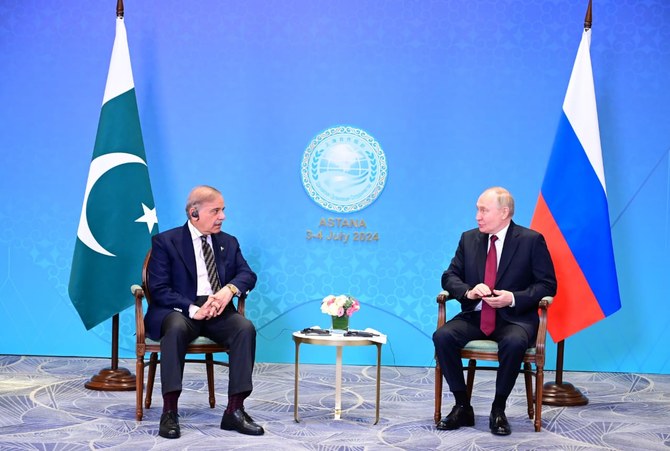ISLAMABAD: Prime Minister Shehbaz Sharif met Russian President Vladimir Putin at the sidelines of the Shanghai Cooperation Organization (SCO) leaders’ summit on Wednesday, saying that ties between both countries stand on their own strength and are not driven by “geopolitical contingencies” or Islamabad’s relations with other nations.
Pakistan and Russia, once Cold War rivals, have warmed up to each other in recent years through regular business and trade interactions. As Islamabad seeks to enhance its role as a transit hub for landlocked economies in Central Asia, it has expressed interest in connecting with Russia through Central Asia for bilateral trade.
Last year, Pakistan began making purchases of discounted Russian crude oil under a deal struck between Islamabad and Moscow. Pakistan also received its first shipment of liquified petroleum gas from Russia, marking Islamabad’s second major Russian energy purchase, despite Western powers’ move to impose sanctions on Moscow for invading Ukraine in 2022.
Pakistan has carefully sought to balance its ties with Washington, a longtime bitter rival of Russia and China, as it moves to enhance trade with Moscow.
“Your excellency, our relations stand on our own strength,” Sharif told Putin on the sidelines of the summit in Astana where leaders and diplomats from India, China, Turkiye, Iran, Kazakhstan, Kyrgyzstan, Tajikistan and Uzbekistan are also in attendance.
“Neither our relations are driven by any geopolitical contingency nor these are impacted by our relations with other countries.”
The South Asian country notified a mechanism for barter trade with Russia, Iran and Afghanistan in February 2023, allowing state-owned enterprises and private sector entities to engage both in imports and export of goods.
Sharif recalled how Pakistan used to engage in barter trade with Russia during the 1950s and the 1960s, saying that Islamabad used to import heavy machinery from Moscow and exported leather goods and textile products to it.
“I think today is the time we can overcome financial and other banking issues by renewing our trade and expanding our trade under barter that will be very beneficial for Pakistan and overcome many problems,” he said.
The Pakistani prime minister congratulated Putin on getting re-elected in March, hoping Russia would progress under his administration.
He said both countries can enhance bilateral trade, which at the moment stood at $1 billion.
Last year, Pakistan began making purchases of discounted Russian crude oil under a deal struck between Islamabad and Moscow. Pakistan also received its first shipment of liquified petroleum gas from Russia, marking Islamabad’s second major Russian energy purchase.
“We received a shipment of oil from your great country and I am very grateful for that,” he said. “But we really need to move further in that direction.”
















